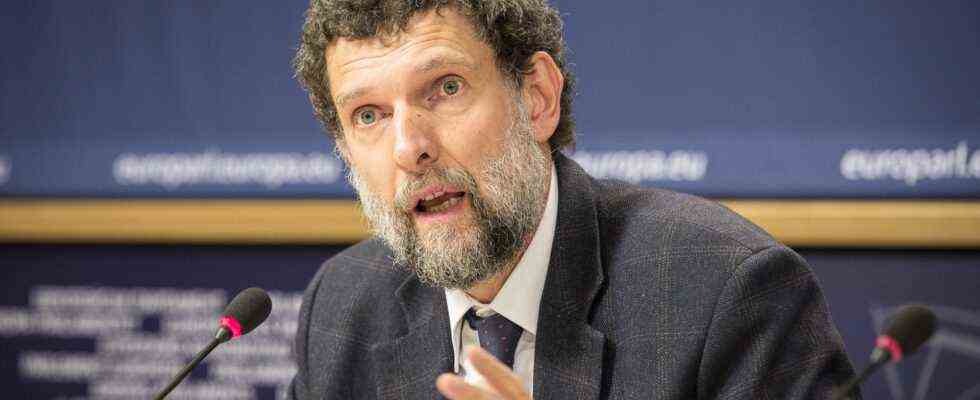Status: 25.11.2021 7:26 p.m.
The imprisoned patron of culture Kavala is back on trial. The Council of Europe is threatening Turkey with expulsion because of this process. But the way there is complicated and influenced by many interests.
As of Friday, human rights and culture promoter Osman Kavala, who has been imprisoned for four years without a judgment, will be on trial again in Istanbul – in a case that concerns human rights activists, the Turkish opposition and EU diplomats and journalists alike: the public prosecutor’s office and, in particular, Turkish President Recep Tayyip Erdogan accuse him of financing the Gezi protests in 2013 and participating in the attempted coup in 2016 – on the basis of allegations that, in the unanimous opinion of independent observers, are unfounded and constructed.
The day of the trial is so exciting because the Council of Europe threatened Turkey with infringement proceedings in September due to the Kavala proceedings – the deadline for this is November 30th. Then the next three-day meeting of the body responsible for such cases in the Council of Europe begins. The threat follows a ruling by the European Court of Human Rights (ECHR) that Turkey has not implemented for more than a year. Because this acquitted Kavala in May 2020 of all allegations of the Turkish judiciary. Turkey ignores the judgment, although as a member of the Council of Europe it is bound by decisions of the ECHR.
Complex process of elimination
Should at least two thirds of the 47 Council of Europe member states vote in favor of proceedings against Turkey, they could be excluded. Frank Schwabe, SPD member of the Bundestag and in the parliamentary group responsible for human rights, assumes that this two-thirds majority is there: there is even a clear majority, he says. Erdogan can only avert the infringement proceedings by changing course during the trial against Kavala.
People familiar with the case speak of house arrest instead of prolonged pre-trial detention or a release with a simultaneous ban on foreign travel.
If the judiciary continues to hold Kavala and the Council of Europe takes its expulsion procedure seriously, a lengthy two-stage procedure will follow, according to Council of Europe circles: After the vote for an expulsion procedure, Turkey will be asked to comment with a corresponding deadline. Following this, the Council must again refer the case to the ECHR with a two-thirds majority – the latter must check whether Turkey has now fulfilled its obligations.
If the ECHR confirms Turkey’s misconduct, the governments of the countries represented in the Council must decide how to proceed. With a two-thirds majority, they could decide to exclude Turkey from the Council of Europe. However, it is said from there that there is no automatism.
Azerbaijan precedent
In the history of the Council of Europe there has only been one infringement procedure: Azerbaijan did not want to release the opposition politician Ilgar Mammadov for years, despite an acquittal by the ECHR. It was only when the council started the proceedings against Azerbaijan that the regime gave in there. Mammadov spent five years behind bars.
Meanwhile, Ankara is hoping that even if Kavala continues to be detained, a two-thirds majority will not be achieved next week. Among the 47 countries there are some, such as Russia or Azerbaijan, which could face the same hardship as Turkey is currently due to politically motivated imprisonment. These are likely to vote against infringement proceedings. In addition, in the run-up to the meeting at the end of November, Turkey could exert bilateral pressure on friendly countries to vote against the procedure.
Council of Europe credibility
Sergej Lagodinsky, Green Member of the European Parliament, has been following the Kavala case for years and has repeatedly asked Turkey to release it. He says the government in Ankara has been trying to make progress in dialogue with the EU over the past few months. To do this, however, it must meet the minimum standards for dialogue, i.e. the human rights of the Council of Europe and thus also the judgments of the competent court, with no ifs or buts. If Turkey does not release Kavala, there must be consequences in the Council of Europe, says Lagodinsky.
If a two-thirds majority is not achieved, this would seriously damage the Council of Europe and the Council’s Court of Human Rights, says SPD MP Schwabe. Hardly any of the 47 member states would then take the ECHR seriously.
The dispute between Turkey and the West over Kavala goes into the next round
Karin Senz, ARD Istanbul, November 25, 2021 7:52 p.m.

